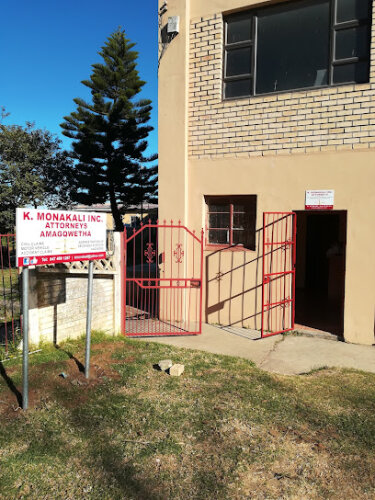Best Divorce & Separation Lawyers in East London
Share your needs with us, get contacted by law firms.
Free. Takes 2 min.
Free Guide to Hiring a Family Lawyer
List of the best lawyers in East London, South Africa
South Africa Divorce & Separation Legal Questions answered by Lawyers
Browse our 1 legal question about Divorce & Separation in South Africa and read the lawyer answers, or ask your own questions for free.
- What can I do to get my divorce settlement
- I got divorced last November, but I haven't received my settlement. It's a story from one to another, so what must I do to get my settlement
-
Lawyer answer by MAH&CO.
Hello, I'm sorry to hear about your situation. If your divorce was finalized last November and you still haven’t received your settlement, it’s important to take legal steps without further delay. In most cases, the court's judgment or settlement agreement...
Read full answer
About Divorce & Separation Law in East London, South Africa
Divorce and separation law in East London, South Africa is governed primarily by national legislation but is also shaped by local court structures and social services. Divorce legally ends a marriage and involves decisions about the division of property, financial support, and the custody and care of children. Separation, while not a formal legal status in South Africa, often involves similar considerations regarding children and shared assets. The East London region is served by the East London High Court and various family-related services, providing residents with access to the legal system for resolving such matters.
Why You May Need a Lawyer
Divorce and separation can be emotionally and financially challenging, often involving complex legal issues. You may need a lawyer in the following situations:
- You and your spouse cannot agree on how to divide assets or property.
- There are disputes regarding custody, care, or contact with children.
- You need to ensure that maintenance or support payments are fair.
- One party is seeking a protection order due to domestic violence.
- You are unsure about your legal rights or obligations under South African law.
- Your spouse has hired a lawyer or you have been served with divorce papers.
- You have significant debts or complicated finances to settle.
- Cultural or religious considerations are complicating the separation process.
In these and other cases, a lawyer can protect your rights, explain your options, represent you in negotiations or court, and help you achieve a fair outcome.
Local Laws Overview
Divorce and separation in East London, as in the rest of South Africa, are regulated by national legislation including the Divorce Act 70 of 1979, the Children’s Act 38 of 2005, and the Matrimonial Property Act 88 of 1984. Some key aspects include:
- Types of Divorce: South African law recognizes two main types of divorce: uncontested (amicable agreement) and contested (disputes over children or finances).
- Grounds for Divorce: The law permits divorce on the grounds of the irretrievable breakdown of the marriage or incurable mental illness.
- Matrimonial Property Systems: Marriages are classified as in community of property, out of community of property, or out of community with accrual, affecting asset division.
- Children: The best interests of the child are always the paramount consideration for custody, care, and contact arrangements.
- Child and Spousal Maintenance: Both parents are obligated to support their children financially, and spousal maintenance may sometimes apply.
- Domestic Violence: Protection can be sought under the Domestic Violence Act if abuse is an issue during separation or divorce.
- Divorce Proceedings: Divorces are generally handled in the High Court; in East London, this would be the East London High Court.
Frequently Asked Questions
What are the different types of divorce in South Africa?
There are two main types: uncontested (where both spouses agree on all matters) and contested (where there are disagreements about children, property, or financial matters). Uncontested divorces are generally faster and less costly.
What are the basic requirements for getting divorced in East London, South Africa?
At least one spouse must be domiciled in South Africa or have lived in the country for at least one year before starting divorce proceedings. The marriage must have irretrievably broken down or one spouse must be mentally incapacitated.
What happens to our property and debt when we divorce?
The division depends on your matrimonial property regime (in or out of community of property, with or without accrual). Assets and debts may be divided equally or according to a prenuptial agreement.
How are decisions made about our children?
South African law prioritizes the best interests of the child when determining care, contact, and guardianship. Parents are encouraged to reach an agreement, but the court will decide if they cannot.
Do I have to go to court to get divorced?
Yes, a divorce must be granted by a court in South Africa. However, if the divorce is uncontested and all agreements are in place, attendance may be limited and the process streamlined.
Who pays maintenance after divorce, and how is it calculated?
Both parents must support their children financially. The amount depends on their respective incomes and the children's needs. Spousal maintenance is not automatic and must be applied for during divorce proceedings.
What if there has been domestic violence?
You can seek immediate protection via a Domestic Violence Protection Order from the court. This can run parallel with your divorce or separation proceedings.
How long does the divorce process take in East London?
Uncontested divorces can be finalized within a few weeks to a few months. Contested divorces may take a year or more, depending on the complexity and cooperation of the parties.
What documents do I need to start divorce proceedings?
Typically, you will need your marriage certificate, identity documents, proof of residence, and any relevant agreements (like antenuptial contracts or parenting plans).
Can we settle our divorce through mediation?
Yes, mediation is often encouraged, especially when children are involved. It can help resolve disputes amicably and reduce costs and stress.
Additional Resources
If you are seeking more information or support around divorce and separation in East London, the following resources may be helpful:
- Department of Justice and Constitutional Development: Offers guidance on court procedures and legal rights in family matters.
- Family Advocate's Office (East London): Assists in matters involving children, such as care and contact disputes.
- Legal Aid South Africa: Provides free or subsidized legal assistance to qualifying individuals.
- Domestic Violence Helpline: Provides support and advice for those facing abuse during separation or divorce.
- Law Society of South Africa: Can refer you to qualified family law attorneys in East London.
- South African Police Service (SAPS): For urgent assistance and intervention in cases of abuse or safety concerns.
Next Steps
If you find yourself considering divorce or separation in East London, South Africa, here are practical steps to guide you:
- Reflect on your situation and make sure you wish to proceed with legal separation or divorce.
- Gather all important documents, including marriage certificates, identification, proof of income, and evidence of assets or debts.
- Consult with a qualified family lawyer in East London to assess your rights, responsibilities, and options.
- If children are involved, consider discussing arrangements with your spouse or through mediation, always prioritizing their best interests.
- Visit or contact the local High Court or Family Advocate’s Office for procedural guidance or required forms.
- Consider utilizing mediation services to resolve issues amicably where possible.
- If you are concerned about your safety or that of your children, contact the police or local support services immediately.
- If eligible, apply for Legal Aid to assist with legal costs.
- Keep records of all communications and agreements reached during the process.
- Stay informed and seek support from local community organizations and professional services as needed.
Divorce and separation can be emotionally taxing, but with the right information and support, you can navigate the process more confidently and achieve a result that is fair and in the best interests of all involved.
Lawzana helps you find the best lawyers and law firms in East London through a curated and pre-screened list of qualified legal professionals. Our platform offers rankings and detailed profiles of attorneys and law firms, allowing you to compare based on practice areas, including Divorce & Separation, experience, and client feedback.
Each profile includes a description of the firm's areas of practice, client reviews, team members and partners, year of establishment, spoken languages, office locations, contact information, social media presence, and any published articles or resources. Most firms on our platform speak English and are experienced in both local and international legal matters.
Get a quote from top-rated law firms in East London, South Africa — quickly, securely, and without unnecessary hassle.
Disclaimer:
The information provided on this page is for general informational purposes only and does not constitute legal advice. While we strive to ensure the accuracy and relevance of the content, legal information may change over time, and interpretations of the law can vary. You should always consult with a qualified legal professional for advice specific to your situation.
We disclaim all liability for actions taken or not taken based on the content of this page. If you believe any information is incorrect or outdated, please contact us, and we will review and update it where appropriate.












